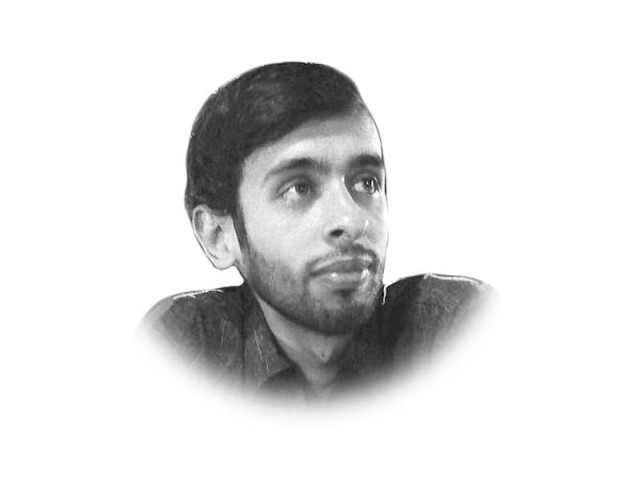What can the IS offer Pakistani militants?
The IS can be considered an amateur in terrorism when compared to its Pakistani counterparts

The writer is pursuing a PhD in Computer Vision from NUST and is an assistant professor at Bahria University. He tweets @1Umair7
Let us break this down a bit. As far as I understand, the IS wants to implement a strict form of Sharia law as a pan-Islamic caliphate; it wants to wipe out various sects; it labels those who do not support them as infidels; it encourages jihad against the West; it makes videos of brutal killings and beheadings and uses social media for propagation.
Those who are aware of the religious dynamics of Pakistan can very well see that all the points I mentioned about the IS are already present in Pakistan. Several organisations with such aims and objectives have been functional in Pakistan for well over a decade prior to the formation of the IS. In fact, the IS also has a serious disadvantage in that it is based thousands of miles away and thus, in no position to offer any kind of material support or create a consistent, reliable platform.
Another factor which the IS clearly lacks is that they split up with the main pan-Islamic militant movement, al Qaeda, which leads the jihadis of Pakistan and Afghanistan. After declaring their own caliph, they were not careful to denounce the widely-accepted jihadi Amir of the Afghan Taliban movement, Mullah Umar. Pakistan’s jihadi landscape is occupied by these two main streams i.e., the Afghan Taliban and al Qaeda. The third and most important militant organisation is the Tehreek-e-Taliban Pakistan (TTP), which operates solely in Pakistan and has a modus operandi similar to that of the IS, did not swear allegiance to Abu Bakr al Baghdadi. There were some random defections towards the IS in Afghanistan, but as a whole, the TTP did not fall for IS. The TTP also released a detailed document denouncing the caliphate of Abu Bakr, on grounds that there is no consensus amongst the jihadi Muslim organisations on their Leadership. Therefore, the extremely fertile jihadi grounds in Pakistan have already been occupied by the TTP, Taliban and al Qaeda. Then there are some state-sponsored jihadis like Jamatud-Dawa and Jaish-e-Mohammad, which fill in any gaps for additional jihadi urges. They are fully controlled and ready to be used for our foreign policy objectives in Kashmir, India and Afghanistan. Consequently, to enter these circles from thousands of miles away and expecting the existing jihadis to denounce their leaderships which nurtured them, is next to impossible.
Moreover, the IS considers various sects as infidels. Does that sound familiar? We already have our own version of the IS in the form of Sipah-e-Sahaba and Lashkar-e-Jhangvi, who have demonstrated their capability to create havoc in society with exceptional resourcefulness and expertise. What else can the IS offer to people with sectarian leanings? I think it can easily be considered amateur in this business, when compared to those who have been in this profession for more than 25 years now.
If we talk about the ideological appeal that IS has to offer in the form of the idea of the caliphate and implementing Sharia, then there is still way too much and far more credible competition. Pakistan has a presence of ideological carriers of the idea of a caliphate in the form of organisations such as Tanzeem-e-Islami and Hizbut-Tahrir. These groups present a very modern image of a caliphate as compared to the IS image, which kills muslims and non-muslims alike. Tanzeem-e-Islami has a presence from the 1990s and has been propagating a non-violent method of establishing a caliphate in the country. Hizbut-Tahrir has been chanting the slogan of a caliphate from 1950s, after its formation in Palestine. It presents itself as a pan-Islamic movement, has a deep ideological appeal, is non-militant, has a strong presence on social media and has been advocating the idea in Pakistan from the early 2000s. Both of these organisations have categorically rejected the IS caliphate and its tactics and have, therefore, side-lined this aspect of IS ideological appeal within the country.
Therefore, when people say Pakistan has a fertile ground for the IS to propagate, I would consider it a superficial argument at best. The correct argument would be that Pakistan has a fertile ground for the political idea of a caliphate/Sharia law, the support for militant jihad and support for militancy against sects. But all three notions are locally occupied. Moreover, the seat bearers have also openly rejected to entertain a member who has nothing new to offer in terms of resources or ideas.
Published in The Express Tribune, March 28th, 2016.
Like Opinion & Editorial on Facebook, follow @ETOpEd on Twitter to receive all updates on all our daily pieces.















COMMENTS
Comments are moderated and generally will be posted if they are on-topic and not abusive.
For more information, please see our Comments FAQ